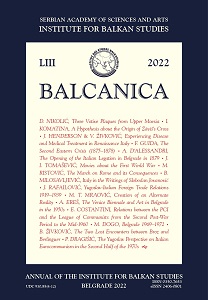The March on Rome and its Consequences
The March on Rome and its Consequences
Views of Yugoslav Contemporaries
Author(s): Milan RistovićSubject(s): History
Published by: Balkanološki institut - Srpska akademija nauka i umetnosti
Keywords: Kingdom of Serbs; Croats and Slovenes; Italy; Dalmatia; irredentism; fascism; Fiume/Rijeka question; nationalism
Summary/Abstract: This paper looks at the Yugoslav public’s reactions to the rise of fascism and Mus- solini’s coming to power in Italy. The main source for the analysis of this change at the top of power structure have been texts published in the contemporary Serbian, Croatian and Slovenian daily press, periodicals and publications. Among their authors were active diplomats of the Kingdom of Serbs, Croats and Slovenes, influential political figures of diverse political leanings. Observation of the rise of fascism, its violent “methodology” of disposing of its political rivals, the misplaced response of the traditional centres of power and the ceding of ground to the fascists caused concern on the east side of the Adriatic over further radicalization of Italian nationalism and irredentist claims in spite of the obliga- tions assumed under the treaties concluded by the two governments.
Journal: BALCANICA
- Issue Year: 2022
- Issue No: 53
- Page Range: 115-140
- Page Count: 26
- Language: English

